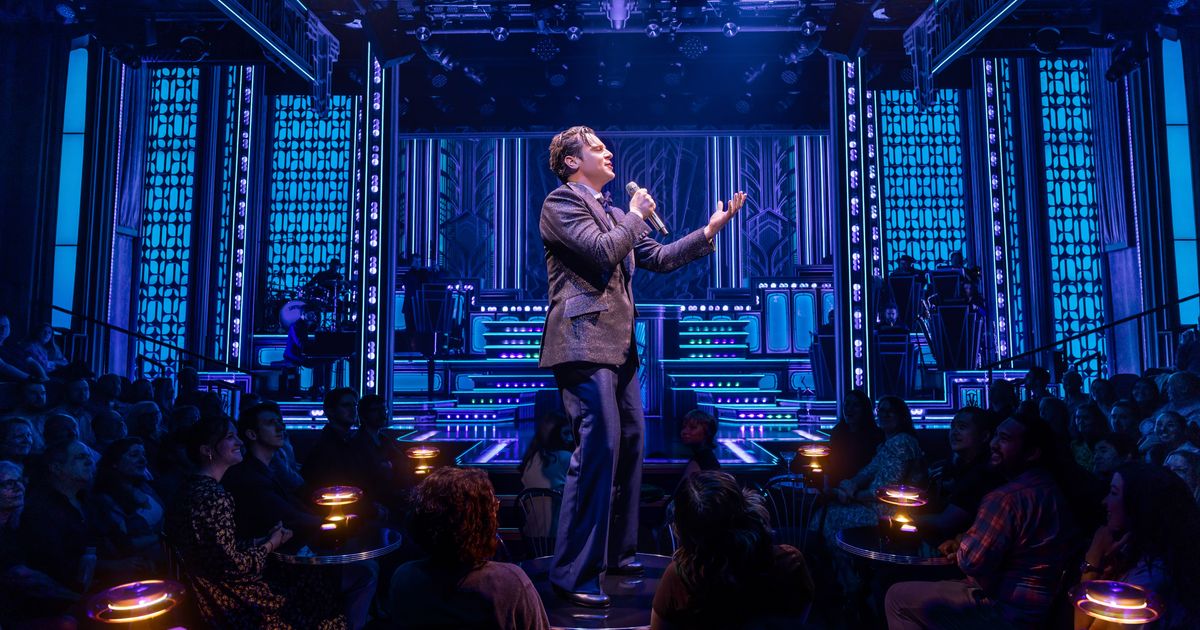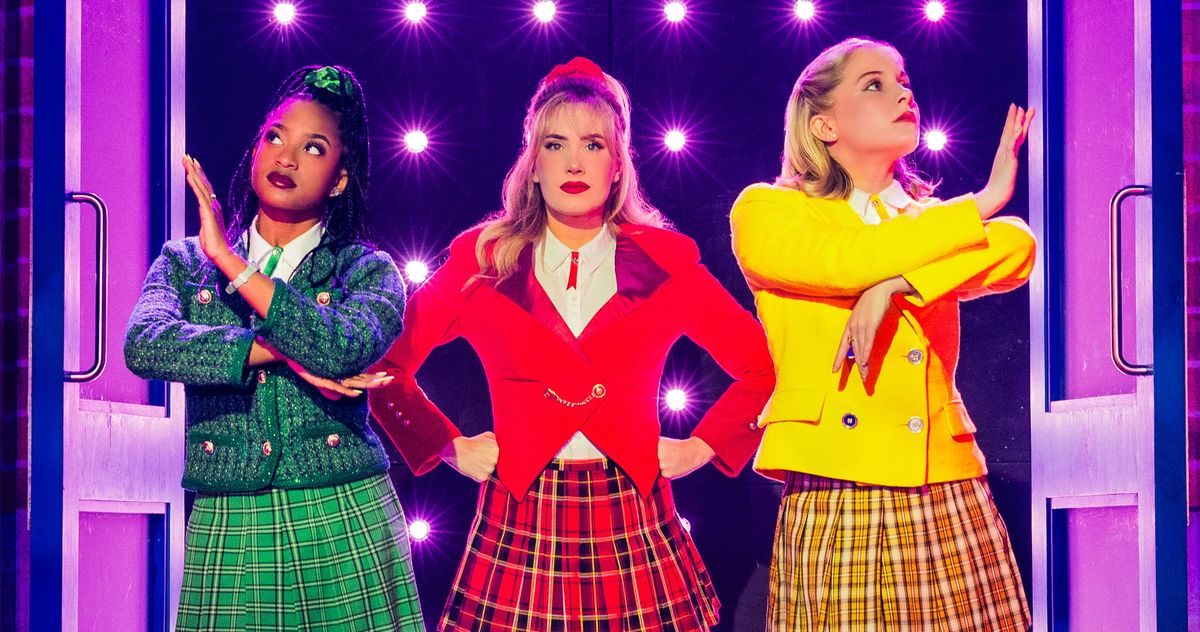Somewhere beyond the sea: Jonathan Groff in Just in Time.
Photo: Matthew Murphy
It’s easy for a show to lose its sense of purpose somewhere along the way to Broadway: The director lost whatever artistic impulse they had at the start, the producers hedged their bets on its commercial prospects, the original star left for a television gig, and what finally premiered is something half-baked and compromised, the kind of thing that leaves you sitting there in the audience wondering why any of this is happening. This is not true of Just in Time, a bio-musical about mid-century crooner Bobby Darin starring Jonathan Groff. You can immediately tell why Just in Time exists. It’s because Jonathan Groff is obsessed with Bobby Darin. He tells you as much right from the top of the show, in direct address as himself: “He loved this,” Groff announces, in a tuxedo, gesturing between himself and the stage. “It was the only relationship he was any good at. Honestly? Same.”
What follows is a fairly generic musical retelling of Darin’s life that offers, simultaneously, insights into its eager-to-please star. Groff, hot off a Tony win for his melancholy but golden Franklin Shepard in Merrily We Roll Along, has found a way to finally bring his fascination with Darin, who burned fast and bright as a singer and national celebrity and died at 37 from a longstanding heart condition, to a Broadway stage. It helps, in this case, that Groff’s interest in the singer has enough overlap with the ticket-buying interests of tri-state audiences who might’ve grown up listening to him to make the project commercially viable. (That Kevin Spacey also had an interest in Darin that he turned into a film is a notable quirk of coincidence in this whole business.) Onstage, Groff tells his audience he grew up in Amish Pennsylvania, dancing along to his father’s Darin records in his mom’s pumps. Elsewhere, he’s also discussed how a brief run performing Darin’s songs at the 92nd Street Y in 2018 magnified his interest in the singer, marking the origin point of the show, since developed with Alex Timbers. That Groff would find so much to relate to in Darin is, on the surface level, pretty incongruous, though with time and Groff’s relentless and fedora-forward commitment to the bit, it all starts to make sense. Darin was an Italian-American playboy known for ditties like “Dream Lover” and “Mack the Knife” and his messy marriage to Sandra Dee. Groff is a gay star of musical theater (as well as television like Glee, Looking, and Mindhunter, which does get a shoutout, and films like Frozen and Matrix: Resurrections). But his career did have a similar rocket-speed launch, starting with Spring Awakening, and like Darin he does possess a voice that could’ve been forged from a metal in a fantasy novel, like Mithril or Orichalcrum. But more crucially, he professes to connect deeply to Darin’s sense of feeling at home only while performing. Even if Jonathan Groff didn’t tell you himself in the prologue, Just in Time would make it clear. In Timbers’s staging, Circle in the Square (referred to in-show as “the basement of Wicked”) has been transformed into a 1960s nightclub, with premium-priced table seating available in the splish-splash zone (yes, there is also a joke about spit). Groff is undeniably great at bending a crowd around his little finger, and he’s working with an audience that’s delighted to be pandered to. He spends much of the show weaving through that crowd and traipsing up the aisles and back to find people to flirt and dance with, like a Labrador licking his way through a maze in search of treats. How could you deny this guy the adulation he craves?
Groff’s enthusiasm does a lot of work toward carrying Just in Time through the backstory homework, but otherwise the show accedes to the standard beats of a bio-musical. The book, by Warren Leight and Isaac Oliver, is peppered with hoary one liners—we’re heavy on New Jersey jokes here—that fit the throwback tone of the evening. Bobby, born Walden Robert Cassotto, grows up in Upper Manhattan with a Copa-obsessed mother (a stately Michele Pawk) and bothersome sister (Emily Bergl), woos a young Connie Francis (Gracie Lawrence) while trying to launch a songwriting career, and then ends up in front of the microphone himself. Though the trajectory is familiar, Timbers speeds the action along by having Groff transition between scenes by snapping his fingers, which triggers a matching shift in Justin Townsend’s lighting. A trio of dancing and back-up singing “sirens” played by Valeria Yamin, Christine Cornish, and Julia Grondin, also trail Groff’s Darin throughout the action and keep popping their heads through in random nooks and crannies in Derek McLane’s blindingly chromed set. Grace LeMieux’s choreography keeps them in ceaseless motion, and I had visions of them sprinting around backstage to hit their marks, grabbing rubber-ducky props for the “Splish Splash” sequence along the way.
Timbers is never a low-key director, and though this is fluffy material, he is energized by a showy star and riffing on the kinds of tricks he’s done in Here Lies Love and elsewhere. But though the flow is well-engineered, the cliches do accumulate like sediment in the plumbing. By the end of Act One, Darin’s arguing with his controlling bosses at the record label who won’t let him record the music he wants (in an inversion of the usual trope, they want him to do rock and roll while he wants to stick to standards). Much of Act Two, then, gets bogged down in Darin’s unhappy marriage to Sandra Dee (Erika Henningsen, late of Mean Girls). Henningsen is appropriately charming but brittle, but the show doesn’t have much oxygen to spare for anyone except Darin, and she quickly becomes yet another admirer who loves him from afar but just can’t understand him. Only Lawrence, arriving on Broadway after The Sex Lives of College Girls, is able to briefly wrench the show’s center of gravity away from Groff, and only because her belt is so full it bursts through the theater like Alice expanding past the size of a house in Wonderland.
Otherwise, the focus snaps right back to Darin—or to Groff as Darin, or Darin as a way of understanding Groff. The two personages blur in Just in Times’s second act, where Darin starts pushing the people around him away because they just don’t understand his need to perform all the time. After a brief sojourn to Big Sur to find himself (very Redwood of him) and some family revelations, Darin returns to the Copa for a series of performances near the end of his life, ignoring reminders of his physical frailty. For a show that presents as a crowd-pleaser, Just in Time gets dark. Timbers stages the sequence like it’s All That Jazz, with Groff seducing and swaying in one moment and then gasping for air with a thudding heartbeat the next. The energy verges from electric to manic, in a way that makes you wonder Is Jonathan Groff telling us that he would like to die mid-performance? All right, that’s an exaggeration, but it does move the question of what a star gets out of entertaining, and what an audience gets out of receiving that performance, right to the center of the show, more so than the specific biography of Darin himself. It’s like Prospero at the end of The Tempest turning to the audience to be, finally, released by their applause—if Prospero were wearing a tuxedo and crooning “Beyond the Sea.” Still, as you from crimes would pardoned be, let your indulgence set him free. Cue the megamix.
Just in Time is at Circle in the Square.












